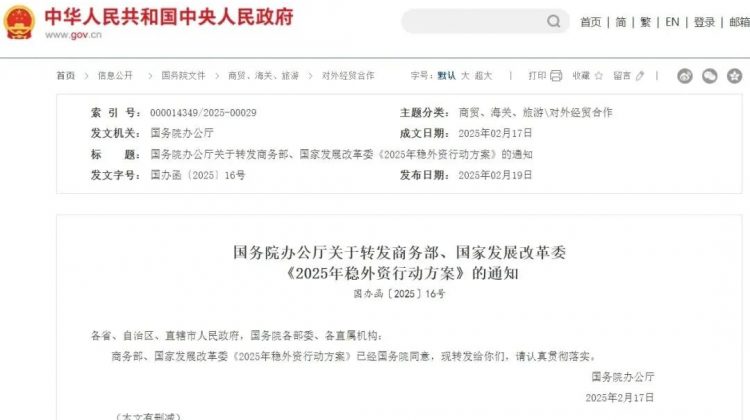
China 2025 Action Plan for Stabilizing Foreign Investment
Foreign investment is crucial for promoting high-level opening-up. It plays an important role in fostering new quality productive forces and advancing Chinese modernization. China has thus formulated this action plan to intensify efforts to attract and stabilize foreign investment in 2025.
The plan comes courtesy of the Ministry of Commerce and the National Development and Reform Commission, with a nod from the State Council. It’s a blueprint of policy tweaks and incentives designed to smooth out the ride for foreign capital, making it easier (and hopefully more attractive) to do business here.
Moreover, the government is lifting restrictions on domestic loans for foreign enterprises, enabling them to leverage local financing for equity investments and regional expansion. Multinational corporations are also encouraged to establish regional headquarters in China, with regulatory adjustments aimed at easing foreign exchange management, personnel mobility, and data flow.
Let’s take a closer look.
1 Opening Up More Industries for Foreign Investment

Expand pilot programs in Telecom, Healthcare & Education: More Doors Opening
China is expanding market access in key industries like telecommunications, healthcare and education. Here’s what’s happening:
· Testing the Waters: Pilot programs (small-scale test runs before full implementation) are continuing in value-added telecom services (things like cloud computing and online platforms), biotechnology and fully foreign-owned hospitals.
· Dedicated Support: Special task forces (teams of experts) will guide foreign investors through the setup process, making it easier to get projects up and running.
· Bigger Plans Ahead: More pilot programs in telecom and healthcare are in the pipeline, meaning further openings down the road.
🔸🔷🔹🔹🔷🔸
Manufacturing: Remove restrictions and Wide Open for Foreign Investment
· No More Restrictions: The manufacturing sector is now fully open to foreign investors – no red tape, no restrictions.
· Equal Treatment: Foreign businesses will be treated the same as domestic ones in all sectors that aren’t on the “negative list” (a list of industries where investment is still restricted).
· More Industries Opening Up: The negative list itself is getting trimmed down, meaning fewer restrictions and more opportunities.
Biopharma: A Smoother Ride for Foreign Companies
·Joining the Club: Foreign companies can now participate in different parts of biological product manufacturing (like vaccines and medical treatments).
· Faster Approvals, Less Bureaucracy: China is speeding up the approval process for pilot programs, tightening quality controls and helping companies resolve issues quickly.
· Better Drug and Medical Device Policies: Expect faster approvals for new drugs, fairer pricing policies, and more transparency in how medical devices are purchased.
2 Making China More Attractive for Foreign Investors

Opening Up More Opportunities for Foreign Investment in Public Companies
· Clearer Rules: New guidelines will make it easier for foreign investors to make strategic investments in Chinese-listed companies.
· More Foreign Investment Wanted: China is rolling out the welcome mat for foreign institutional investors, including major funds and publicly traded companies.
🔸🔷🔹🔹🔷🔸
Boosting the ‘Invest in China’ Brand
· Better Support for Foreign Investors: China is refining its investment promotion strategies to make it easier for foreign businesses to enter the market.
· International Investment Events: More global investment summits and networking events will help attract foreign capital and strengthen manufacturing supply chains.
🔸🔷🔹🔹🔷🔸
Encouraging Foreign Businesses to Reinvest in China
· A Business-Friendly Environment: Policies will ensure foreign companies get fair treatment and face fewer hurdles.
· Profits Stay in China: Foreign businesses will be encouraged to reinvest more of their earnings instead of taking them out of the country.
· Tracking Reinvestment: Pilot programs will help track and report foreign companies’ reinvestment activities in China.
🔸🔷🔹🔹🔷🔸
Expanding Industries That Welcome Foreign Investment
· More Sectors Open for Business: The list of industries where foreign investment is encouraged is getting longer.
· Support for Advanced Manufacturing: Investment policies will favor high-quality, high-tech manufacturing.
· Focus on Central & Western China: More incentives will be introduced to attract foreign investors to less-developed regions like central, western, and northeastern China.

🔸🔷🔹🔹🔷🔸
Making It Easier for Foreign-Owned Companies to Access Local Loans
· More Flexibility with Loans: Foreign-invested holding companies (parent companies of multiple businesses) can now use loans from Chinese banks to invest in other businesses.
· Simplifying HQ Setups: Multinational corporations will find it easier to establish regional headquarters in China.
🔸🔷🔹🔹🔷🔸
Smoother Mergers & Acquisitions (M&A) for Foreign Investors
· Faster, Easier Deals: China is refining its M&A regulations to simplify the process for foreign companies looking to acquire or merge with Chinese businesses.
· More Flexibility for Cross-Border Investments: The scope of M&A transactions is expanding, and the requirements for cross-border share swaps (where companies exchange ownership stakes) are being lowered.
🔸🔷🔹🔹🔷🔸
More Foreign Investment in Key Industries
· Agriculture & Manufacturing: Foreign investors are being encouraged to invest in livestock breeding, equipment manufacturing, and veterinary medicine production, with guarantees that they’ll receive the same treatment as domestic companies.
· High-Tech & Industrial Growth: China wants foreign companies to play a bigger role in its push for high-tech industrialization.
· Consumer-Driven Sectors Opening Up: More opportunities are being created in elderly care, culture & tourism, sports, healthcare, vocational education, and financial services, all in response to growing consumer demand.

🔸🔷🔹🔹🔷🔸
Expanding & Strengthening Free Trade Zones (FTZs)
· Bigger, Better FTZs: China is making Free Trade Zones more efficient and giving them greater freedom to experiment with reforms.
· Hainan Leading the Way: The Hainan Free Trade Port is getting special policy boosts to become a major foreign investment hub.
· Testing the Limits: FTZs will conduct “stress tests” to explore further liberalization in areas like foreign investment rules, regulations, and standards.
🔸🔷🔹🔹🔷🔸
Pushing Forward Major Foreign Investment Projects
· More Big-Ticket Investments: The list of major foreign-funded projects is growing, and those projects will receive stronger policy support.
· Faster Approvals & Construction: Government agencies are working to speed up the approval process and get projects off the ground faster.
🔸🔷🔹🔹🔷🔸
Easier Access to Financing for Foreign Businesses
· More Loan & Investment Options: Banks and financial institutions are being encouraged to offer more financing solutions tailored to foreign businesses.
· Better Understanding of Foreign Companies’ Needs: The government will survey foreign businesses about their investment and financing challenges, then set up matchmaking events to connect them with financial institutions.
· Stronger Collaboration with Investment Funds: Foreign companies will be encouraged to partner with Chinese investment funds to expand their business in China.

🔸🔷🔹🔹🔷🔸
Making It Easier for Foreign Talent to Work & Travel in China
· Visa-Free Travel Expansion: China is negotiating more mutual visa exemptions and expanding the list of countries whose citizens can enter visa-free.
· Better Travel Policies: Improvements are being made to port visas, transit visa exemptions, and regional visa-free entry policies to simplify international travel.
· A New Guide for Expats: An updated version of the “Guide to Working and Living in China” will provide useful information for foreigners moving to China.
🔸🔷🔹🔹🔷🔸
Simplifying Trade for Foreign Businesses
· Easier Access to Tariff Reductions: The process of getting Certificates of Origin (which allow goods to qualify for reduced tariffs under trade agreements) will be streamlined.
· Smoother Import Processes: Regulations on importing key equipment for major foreign investment projects will be optimized.
· Faster, Less Disruptive Customs Checks: China will reduce random inspections and strengthen its Authorized Economic Operator program, which helps trusted companies clear customs faster.
· More Inspection Institutions Approved: More qualified domestic and foreign organizations will be authorized to inspect imported goods, making the process quicker.
· Stronger Intellectual Property Protection: Foreign businesses will be encouraged to register their trademarks and patents in China, with tougher enforcement against intellectual property violations in imports and exports.
The introduction of the 2025 Action Plan is not only a proactive response to the various demands of foreign enterprises but also a firm step toward promoting high-quality economic development and deepening global trade and economic cooperation.
We believe—and are confident—that foreign investment in 2025 will remain stable and is bound to stay strong!
